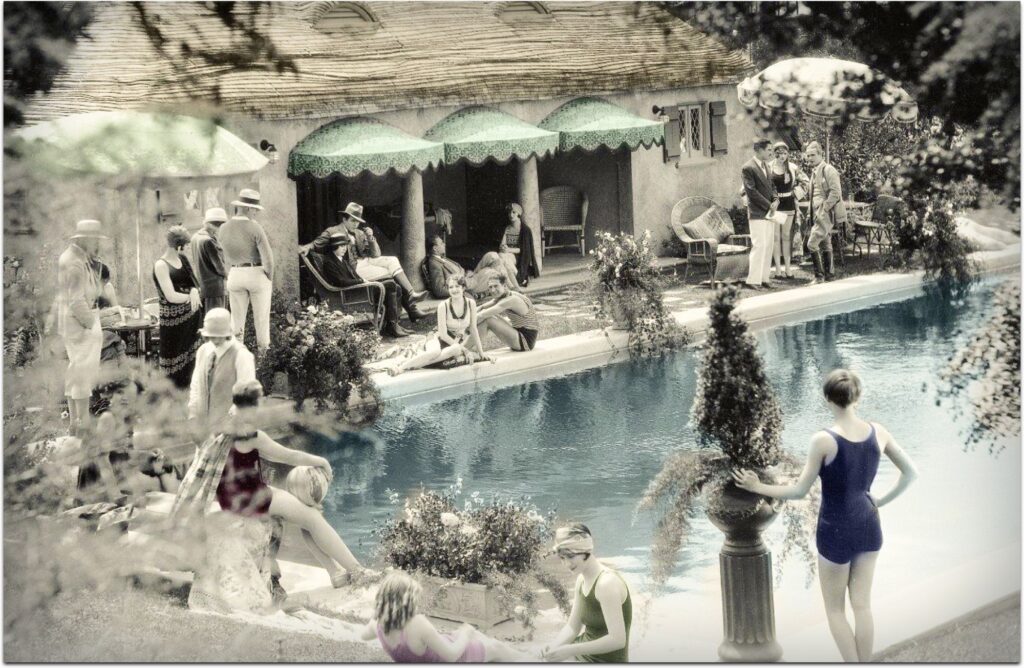George and Gertrude Lewis were wealthy San Francisco blue bloods. George owned Shreve & Co., the famed San Francisco jewelry emporium founded in 1852 and purchased by Lewis in 1912. Their great wealth— and unusual marriage—enabled the Lewises to create Hill Grove, one of the most beautiful and most storied estates in the history of Beverly Hills.
When the Lewises built Hill Grove, Benedict Canyon was still mostly rural and largely empty of residences. Ranch land and a few citrus groves were located on the lower, flat terrain, and patches of chaparral and clusters of live oaks dotted the steep, arid hillsides. Benedict Canyon Drive was a dirt road. Equestrians from the Beverly Hills Hotel were a frequent sight on the road and nearby open land.
Aerial photograph of the west side of Benedict Canyon in 1926. Photo Credit: Author’s Collection.
Upon its completion, ten-acre Hill Grove was a startling sight. Its grand wrought-iron gates, which stood on dusty, unpaved Angelo Drive, opened into a long, paved driveway that wound up the hill to the mansion, passing the swimming pool near the bottom of the property and the expansive, grassy lawns, which required a team of gardeners for constant watering and care.
For an estate of its architectural distinction, extensive grounds, and prominent location, Hill Grove nonetheless received almost no public notice upon its completion in 1925. Why?
George and Gertrude Lewis—in true, blue-blood fashion—did not actively seek publicity for the estate. They weren’t actors like Mary Pickford and Douglas Fairbanks Sr. They weren’t producers like Thomas H. Ince. They didn’t need to get press coverage by showing off their home, or to send out publicity stills to newspapers and magazines to increase the adulation of their fans. They weren’t a part of the Hollywood hierarchy.
But they were starstruck. Or at least Gertrude Lewis was.
Gertrude Lewis also used Hill Grove to participate vicariously in the film industry. She, like other wealthy property owners, rented out her estate for films and publicity stills for several decades.
This pool scene – complete with 1920s “flappers” – appeared in the 1926 film Kid Boots, starring Eddie Cantor and Clara Bow. Photo Credit: Bison Archives
Soon after Hill Grove was completed, it played a leading role in Clara Bow’s Kid Boots for Paramount in 1926. The estate appeared in Monogram’s 1932 film Police Court. In 1932, it was featured in the Laurel and Hardy film, Pack Up Your Troubles.
Hill Grove also appeared in Republic’s King of the Newsboys (1938), starring Lew Ayres and Helen Mack; The Crooked Road (1940); You Belong to Me (1941), starring Barbara Stanwyck and Henry Fonda; Manhunt of Mystery Island (1945); Betty Co-Ed (1946); and Night and Day (1946), a completely fabricated Warner Bros. bio-pic of composer Cole Porter starring Cary Grant and Alexis Smith.
In 1949, Hill Grove was the perfect stand-in for “stately Wayne Manor” in Columbia’s Batman and Robin serial. Hill Grove—its gates, its long and winding driveway, and particularly its impressive motor court—appeared in many additional films.
In 1934, Gertrude leased Hill Grove to highly regarded movie producer Walter Wanger and his first wife, Justine, for one year, for a total rent of $18,000. Big mistake.
The Hill Grove Estate. Photo Credit: Bison Archives.
When Gertrude returned to Beverly Hills in 1935 after a year in Europe, the estate was in shambles. Inside the house, furniture, art, vases, and glassware were damaged. The lawn and gardens were dying from neglect and lack of water.
Wanger refused to pay for any damages, so the Lewises took him to court in June 1935. The trial instantly became a made-for-the-media sensation.
Like several of the great Benedict Canyon estates, Hill Grove was demolished and its grounds subdivided in the 1960s. Today, Hill Grove, which had been such a prominent Benedict Canyon landmark for so many years, and which appeared in so many films, has vanished entirely.
